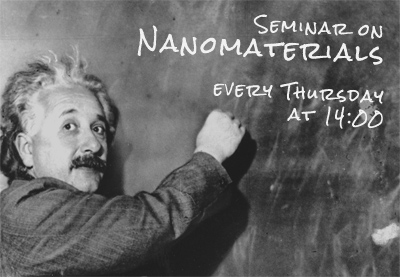Nanoseminar
Group of Structure analysis at the Department of Condensed Matter Physics
of Charles University and MGML has a pleasure to invite you to attend the seminar on nanomaterials: Physics, Technology, Applications
on 14th December 2023 at 14:00
at Faculty of Mathematics and Physics of Charles University, Ke Karlovu 5, 121 16 Praha 2
Lecture room F2
Yevheniia Lobko
Department of Surface and Plasma Science, Faculty of Mathematics and Physics, Charles University
Investigating the Structure and Properties of Nanocatalysts for Fuel Cells and Water Electrolyzers
Yevheniia Lobko » Investigating the Structure and Properties of Nanocatalysts for Fuel Cells and Water Electrolyzers
Department of Surface and Plasma Science, Faculty of Mathematics and Physics, Charles University
Location: F2
Hydrogen technology has emerged as a vital and increasingly popular direction, especially with the rise of fuel cells and water electrolyzers. As a clean, eco-friendly, and highly effective energy source, hydrogen production and usage hold the key to a sustainable future.
We will begin with a brief introduction to Hydrogen Technology, exploring the essence of Proton Exchange Membrane Fuel Cells (PEM FC) and Proton Exchange Membrane Water Electrolyzers (PEM WE).
In the following segments, we will provide a comprehensive examination of our self-synthesized nanocatalysts. We will delve into the relationships between morphology, structure, catalytic activity, and durability of the catalysts. In the second part, the bifunctional catalysts designed for Unitized Reversible Fuel Cells will be shown. These catalysts combine functionalities for both Fuel Cells and Water Electrolyzers. We will dissect the impact of electrochemical activation on their structure, properties, and durability.
The third part will focus on supported catalysts tailored for Water Electrolyzers. We will analyze how the support structures influence the activity and stability of the catalysts, particularly in the Oxygen Evolution Reaction (OER). Additionally, through in-operando experiments, we will observe how our catalysts change their structure and assess its influence on the performance and stability.
In conclusion, the fourth part will delve into our supported catalysts designed for Fuel Cells. Here, we'll examine how the durability of the catalysts' supports plays a pivotal role in shaping the stability and activity of the catalysts, with a specific focus on the Oxygen Reduction Reaction (ORR).


